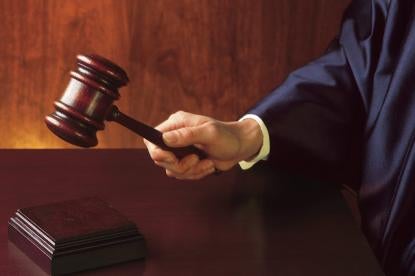The U.S. Court of Appeals for the Federal Circuit issued a sua sponte order vacating its April 20, 2015, decision in In re Tam to consider the constitutionality of Section 2(a) of the Lanham Act, which provides that the U. S. Patent and Trademark Office (PTO) may refuse to register a trademark that “[c]onsists of or comprises . . . matter which may disparage . . . persons, living or dead, institutions, beliefs, or national symbols . . .” The en banc order appears likely to be the Court’s response to Judge Moore’s “additional views” that were appended to the Court’s April 20 panel decision, which affirmed the Trademark Trial and Appeal Board’s (TTAB’s) refusal to register the mark THE SLANTS, concluding it is disparaging to a substantial portion of people of Asian descent. In re Tam, Case No. 14-1203 (Fed. Cir., Apr. 20, 2015) (Moore, J.) The order requests that the parties file new briefs addressing the question of whether “. . . the bar on registration of disparaging marks in 15 U.S.C. § 1052(a) violates the First Amendment.”
The Panel Decision
Simon Shiao Tam is the lead singer of the Asian-American dance rock band The Slants. After the TTAB affirmed the PTO’s refusal of Mr. Tam’s trademark application for THE SLANTS covering live music performances, he appealed to the Federal Circuit. On appeal, Mr. Tam argued that the TTAB erred in finding THE SLANTS mark to be disparaging, and challenged the constitutionality of §2(a) of the Lanham Act.
The Federal Circuit panel noted the existing two-part test for determining whether a trademark is disparaging, which looks at (1) the likely meaning of the trademark in question, and (2) whether that meaning may be disparaging to a substantial composite of the group of people to which the trademark refers. In resolving these issues, the Court explained that the PTO may look to evidence outside of the trademark application to determine the meaning and manner of use of a trademark. In this regard, the Court found that the relevant evidence, such as dictionary definitions, cultural slang and known ethnic slurs, news articles, the band’s own Wikipedia page, and even past interviews with and statements by Mr. Tam indicate that THE SLANTS likely refers to people of Asian descent and is likely offensive to a “substantial composite” of people of Asian descent.
Turning to the constitutionality of §2(a) of the Lanham Act, the Federal Circuit cited its own precedent, In re McGinley, rejecting Mr. Tam’s argument that §2(a) conditions the benefit of trademark registration on the relinquishment of speech. Instead, the Court explained that the PTO’s refusal to register a mark does not affect an applicant’s right to use the mark, and therefore is not an abridgment of First Amendment rights. The Court further explained that §2(a) is not unconstitutionally vague and rejected Mr. Tam’s arguments based on due process and equal protection.
Judge Moore’s “Additional Views”
Despite the unanimous opinion of the panel, Judge Moore authored additional views in connection with the panel appeal, and presented arguments urging the Court to revisit McGinley. Judge Moore referenced the wide criticism that McGinley has received over the past 30 years and noted that the “unconstitutional conditions” doctrine and the protection afforded to commercial speech has evolved “significantly” since McGinley. Judge Moore acknowledged that trademarks are only protected speech under Supreme Court commercial speech jurisprudence, but further noted that, in context, Mr. Tam’s attempted registration of THE SLANTS was not only as a source-identifier (of the band’s services) for commercial purposes, but also for the purpose of political and cultural commentary. Indeed, Mr. Tam, who is of Asian descent, has stated that he selected THE SLANTS name to “reclaim” and “take ownership” of Asian stereotypes.
Although a trademark applicant is not barred from using a mark that has been refused under §2(a), Judge Moore explained thatMcGinley recognizes that the benefits of federal registration provided by the Lanham Act are “significant” and “enhance the value of a mark.” Benefits such as exclusive nationwide use of a trademark, incontestable status, certain statutory presumptions and treble damages, among others, are unavailable when registration is refused under §2(a). According to Judge Moore, the denial of federal trademark rights “severely burdens use of such marks.” Judge Moore also noted that no court, including McGinley, has analyzed §2(a) under the “unconstitutional conditions” doctrine, which holds that the government cannot deny access to a benefit because of the recipient’s exercise of constitutionally protected speech.
Practice Note: The Federal Circuit’s en banc decision in this case will likely have a significant impact on other cases, including the dispute involving various Washington Redskins trademarks and the TTAB’s recent cancellation under §2(a) of six registrations that included the term “REDSKINS.”




 i
i


